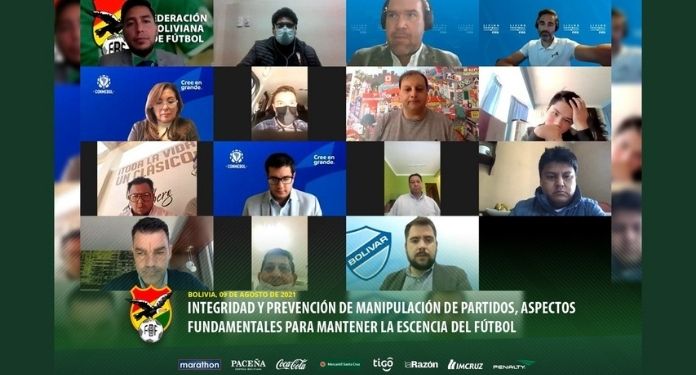The Bolivian Football Federation (FBF) held a training session on match integrity and prevention, which was attended by representatives of football players, officials and FIFA.
The virtual meeting, organized by the Bolivian Football Federation’s Integrity Department, had as speakers FIFA Senior Integrity Manager, Rodrigo Arias, FIFA Integrity Manager, Francisco Chamut, CONMEBOL Ethics and Compliance Director, Graciela Garay , CONMEBOL Integrity Director, Julio Lansac, and FBF Integrity Director, Pablo Camacho.
“The main objective of this training is to move away from this type of behavior that harms the spirit that is the essence of football. It is also important to highlight that the main causes of these acts are economic, sporting and any other type of benefit,” said Arias, who talked about “strategies to avoid” sports fraud.
The lecture covered concepts related to game manipulation, such as the acts that constitute it and their sanctions, and the regulatory framework of FIFA, CONMEBOL and FBF. In addition, the meeting addressed the acts that constitute game manipulation and their sanctions.
“One of CONMEBOL‘s main goals is to promote integrity, so it is our task to promote the protection of football and the rules that govern it,” said Lansac. “We want the results of a match to be indeterminate, because that is the beauty of the sport. When it is subjected to these acts that tarnish its essence, it loses its meaning,” he added.
Chamut said that FIFA’s regulatory framework “encompasses the fight against corruption, doping or match-fixing” and that “it is attributed to the Disciplinary Code that regulates them”. “The message we have to understand is clear: there is no point in falling into this because there are sanctions that can harm the career or the institutions that are the clubs,” he warned.
“It is important to denounce any contact attempt in relation, directly or indirectly, to game manipulation,” Camacho said. “The denunciation channels are elementary to make it possible for these illegal acts to be known, which is why the associations have spaces for denunciations that protect the people who make them”, he concluded.




